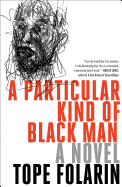
Growing up in 1980s suburban Utah, Tunde, his younger brother and their immigrant Nigerian parents hardly resemble the local Mormon majority. Tunde's father blames his accented English for his inability--despite his U.S. engineering degree--to find meaningful employment, eventually attempting a mobile ice cream business long before food trucks became popular. Tunde's isolated mother succumbs to mental illness and returns to Nigeria; her absence brings both relief and regret for Tunde, who is spared her violent abuse but deprived of her (erratic) comfort. The arrival of a stepmother with two additional siblings further stresses the family's already fragile foundation. Despite the repeated uprootings in Utah, then Texas, Tunde relies on the constancy of his faraway Nigerian grandmother's voice to guide him toward manhood.
While A Particular Kind of Black Man is his debut novel, Tope Folarin is no stranger to the international literary community, having won the 2013 Caine Prize for African Writing. He's embraced the "write-what-you-know" charge, overlapping significant biographical milestones with Tunde, including being Utah-born to Nigerian immigrant parents, a Texan adolescence, and a Morehouse College education. Beyond the cover's "novel" label, Folarin augments his prose with inventive wordplay and typographic layout. He creates a visual representation of a young black man in crisis through Tunde's self-admitted unreliability as narrator ("I'm having false memories"), his switching of pronouns among I, you, he--all in reference to himself--and the scattering of sentences on near-empty pages before he is able to literally pull his story back together. A masterful portrait of identity lost and finally found. --Terry Hong, Smithsonian BookDragon

